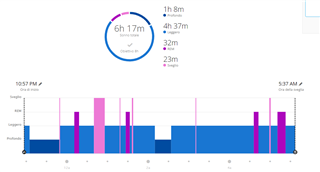I just went through a medical sleep study using a WatchPAT like device and I was curious to see how the Epix 2 metrics would compare.
Overall, with the Epix 2
- sleep time is overestimated, as wake time is only detected half of the time
- light sleep is in the ball park
- deep sleep is underestimated, as it is detected half of the time, and replaced with mostly light sleep, sometimes REM sleep
- Sp02 was mostly off (either way too high or way too low) for the first 2/3 of the night. It was more accurate during the last 1/3. Unfortunately, the highest and lowest points didn't match for the most part.
- Heart rate was OK, but lowest points were not recorded
| Epix2 (v8.16) | Sleep Study | |
| Total duration | 8:19:00 | 8:18:00 |
| Sleep time | 7:53:00 | 7:28:00 |
| Wake time (mn) | 26 | 49 |
| # wake periods | 2 | 7 |
| wake time / duration | 5.21% | 9.93% |
| Sleep phases | ||
| REM / Sleep | 31.08% | 17.25% |
| Light Sleep / Sleep | 62.37% | 69.05% |
| Deep Sleep / Sleep | 6.55% | 13.70% |
| Total | 100% | 100% |
| SpO2 | ||
| Lowest SpO2 | 86% | 83% |
| Maximum SpO2 | 100% | 100% |
| Average SpO2 | 95% | 96% |
| Heart Beat | ||
| Lowest | 47 | 37 |
| Maximum | 74 | 79 |
| Average Heart (bpm) | 52 | 52 |


